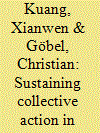| Srl | Item |
| 1 |
ID:
178314


|
|
|
|
|
| Summary/Abstract |
Why do Chinese governments at various levels set up public complaint websites where citizen petitions and government responses can be reviewed by the general public? We argue that it is the result of two factors: strong signals sent by the central government to improve governance, and the availability of new technologies to promote policy innovation. To impress their superiors, local officials adopted newly available commercial technology to innovate existing citizen feedback systems, which presented a developmental trajectory from “openness,” “integration,” to “big data-driven prediction.” Drawing on policy documents and interviews with local politicians and administrators, we provide a chronological perspective of how technical development, central government’s signals and local decision-making have interacted in the past two decades to bring forth today’s public complaint websites. The contingent and non-teleological nature of this development can also be applied to other policies such as the social credit system.
|
|
|
|
|
|
|
|
|
|
|
|
|
|
|
|
| 2 |
ID:
124890


|
|
|
|
|
| Publication |
2013.
|
| Summary/Abstract |
In recent years there has been a proliferation of scholarship on protests and other forms of collective action in China. Important insights have been gained into how conflicts between social groups and local governments begin, which strategies and instruments protesters apply, and under which circumstances protests are likely to succeed or fail. However, comparatively little is known about the mobilizing structures and how such collective action can be sustained over a long period of time, in some instances over several years. Such perseverance would be remarkable even in a democracy, but it is more so in an authoritarian system where the risks of participating in collective action are higher and the chances to succeed much smaller. This article compares the development of public protests in two research locations and identifies four factors instrumental to overcoming the formidable challenges of sustaining collective action in China: the continuing existence of substantial grievances; the re-activation of strong social ties; the presence of unifying frames; and an adaptive protest leadership. The comparison shows that the last factor is particularly crucial: while the two villages were similar in all other respects, leadership in village B was far more adaptive than in village A, which goes a long way towards explaining why collective action could be sustained twice as long in village B.
|
|
|
|
|
|
|
|
|
|
|
|
|
|
|
|